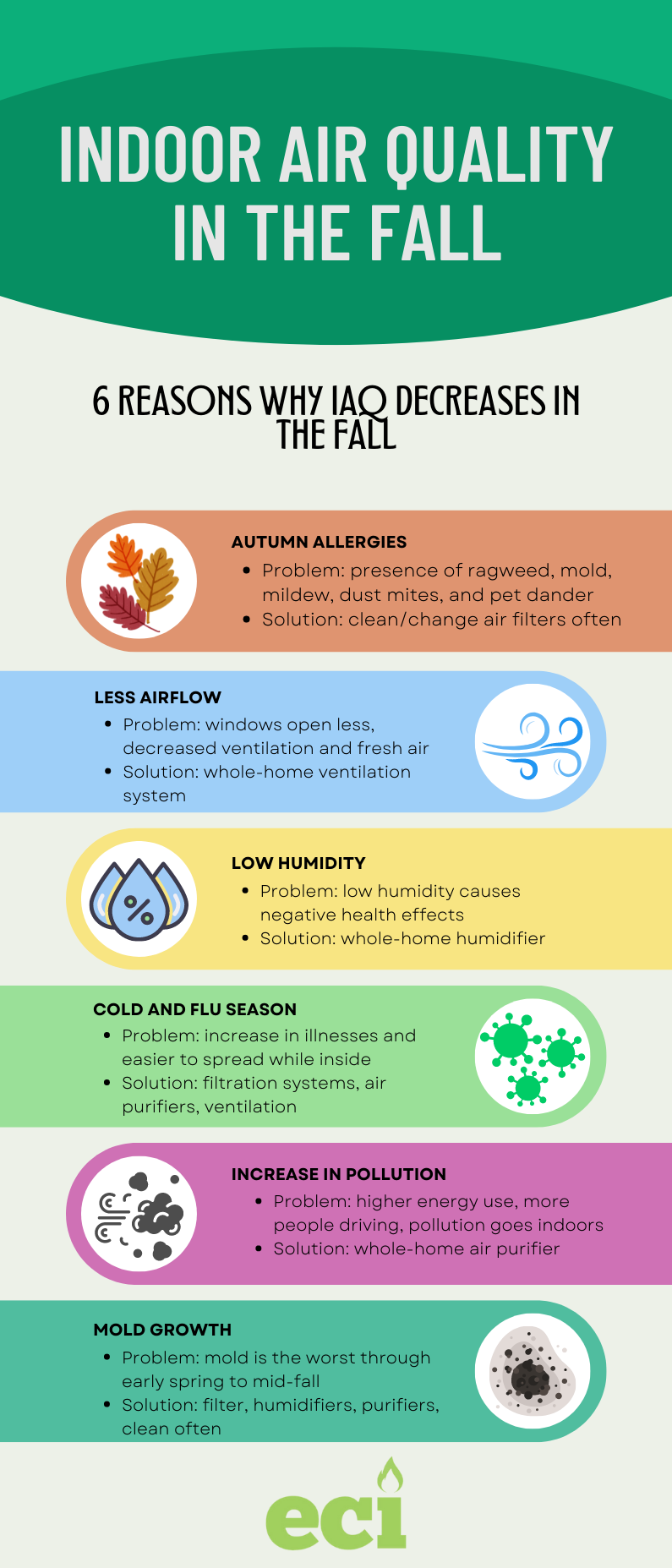It's the first day of Fall, which means you can fully embrace cooler weather, football season, and pumpkin everything. However, a new season also means a change in indoor air quality (IAQ). As the leaves start to change, you should evaluate your indoor air quality to ensure that you'll breathe fresh, healthy air all Autumn.

How Does Indoor Air Quality Change in the Fall?
Autumn allergies
When it comes to seasonal allergies, our minds will often immediately go to spring. Surprisingly, fall brings about a whole host of allergens like ragweed, mold, mildew, dust mites, and pet dander. One simple IAQ solution is to clean/replace your HVAC air filters. The filters in your heating/cooling systems work to trap pollutants in your home. You will need to clean or change your filters every few months, or even weeks, to prevent them from getting clogged and spreading those allergens throughout your home.

Less airflow
Many of us like to keep the windows open during the spring and summer months to let fresh air into the home. When it gets too cold to do so, the fresh air is cut off and natural ventilation declines. With less ventilation, indoor air pollutants and germs have fewer circulation paths, meaning they can get trapped inside and cause irritation. A whole-home ventilation unit, like the AprilAire system, will dilute trapped airborne contaminants such as allergens, viruses, chemicals, and bacteria.
Low humidity
Lower humidity in fall is definitely a relief, especially for those living in and around Philadelphia and Bucks County where the summers are extremely humid. Unfortunately, lower humidity has its own downside. As temperatures cool, the outdoor air becomes dry. On top of this, using the heater in your home makes the air even drier. This can lead to negative health effects such as dry skin and irritation in your eyes, nasal passage, and throat.
The smart solution is to use a humidifier. While portable humidifiers are helpful, a whole-home humidifier that's part of your HVAC system can give you the best relief. Installing a humidifier will help keep your home at ideal humidity levels for optimal health and comfort.

Cold and flu season
Colder weather means cold and flu season; and as the air gets colder and more people are inside, we're also more susceptible to spreading these illnesses. This is worsened by the fact that there's less ventilation in the fall, as mentioned above. Luckily, a combination of air purification, filtration, and ventilation will help combat these nasty germs. Air filtration systems, ventilation systems, and whole-home purifiers will reduce the number of contaminants in your home, keeping your air fresh and IAQ levels high. Keeping your home at an optimal humidity level will also help, as low humidity is known to increase the spread of viruses.

Increase in pollution
There are a few reasons why air pollution increases in the fall. One is that energy use is often higher due to a mixed use of heat and AC during the shoulder season. Additionally, we start to spend more time inside as it gets colder out, thereby increasing both our heat/AC usage and light usage.
Another reason is that people start driving more as opposed to walking or biking. This equates to more exhaust emissions and higher pollution. All of this outdoor pollution will increase the likelihood that pollutants make their way inside the home.
A great solution is to install a whole-home air purifier. Purification systems decontaminate the air that you breathe before it's recirculated into the home, and improve your overall indoor air quality.
Mold growth
Household mold is typically the worst from early spring through the middle of fall. High humidity from heavy rainstorms provides the perfect climate for mold to thrive, as it can grow anywhere in your home where water sits for just a few hours. Mold is common in basements and corners of the home which we tend to pay less attention to. If left untreated, mold spores can spread and circulate around your home, causing you to breathe in unhealthy air.
The most straightforward option is to clean often and look out for wet spots. But mold can also be prevented using many of the HVAC solutions already mentioned above, including high-efficiency air filters, humidification systems, and whole-home purifiers.
The best thing about IAQ systems is that they are multi-functional! Whether you get one type of indoor air quality system or combine a few, you'll start to breathe in healthier air and increase your overall quality of life.

If you live in the Delaware Valley/Greater Philadelphia area and would like to find comfort within your home, visit our website or give us a call at 215 - 245 - 3200.



